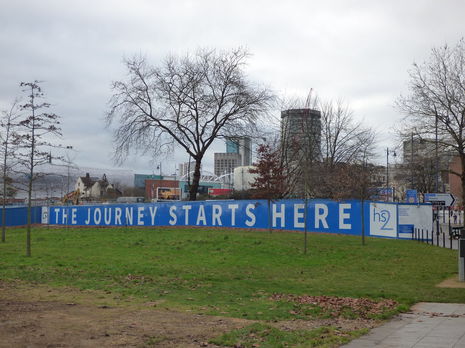Will HS2 do anything to help the North/South divide?
Sarah argues that HS2 should not be the only attempt to bridge the gap between the under-invested North and the over-invested South – a gap that is also reflected in our top universities.

I am yet to be convinced by the HS2 project. HS2 is certainly significant in what it represents through its commitment to the North, a commitment to the faith its people recently placed in a government many swore they would never vote for, and a commitment to tackling the dire state of our national infrastructure. Yet, many northerners are anxious that the rail lines will plough through entire communities, at the expense of rural landscapes and habitats.
The project’s astronomical costs are, at the very least, cause for concern. Indeed, it is baffling how quickly the budget for HS2 is spiralling out of control. How is it the Dutch could build a fifth runway at Schiphol for £300 million, and HS2 already stands to cost the UK £106 billion? Historic lack of investment – and a system that is incompatible with revolutionary new transport initiatives, such as onerous planning laws – inhibits our national progress. What is indisputable, though, is that the lack of investment in our own infrastructure is a serious issue this government needs to address. Not doing so until now has certainly contributed to our inability to commence large-scale infrastructure projects, and the disparity between transportation links in the North and the South.
“Lack of investment in the North has been apparent for generations now.”
Fellow Mancunians will agree that, whatever the eventuality with HS2, northern rail lines are seriously underdeveloped, and city connections for commuters are a vital concern. Northern voters certainly won’t thank the government for neglecting transport links outside of their Westminster bubble. The past few decades have seen investment in the London Overground, the Thameslink project, and Chiltern Railway’s ‘Project Evergreen,’ with very little by way of comparison in northern regions. When travelling down to Cambridge each term, I catch a connecting train from Bolton to Manchester Piccadilly. What should typically be a twenty-minute journey, invariably ends up taking an hour. Connecting northern trains are so prone to delay and cancellation that anything less than ‘travelling paranoia’ would almost certainly result in a missed connection.
The debate over national railways stems from a deeper issue. Many people in the northern regions feel that the capital is disconnected from the sympathies of the general population, a concern that is reflected in expenditure. Greater London receives more spending per head of the population than any other English region. It may be the centre of the UK’s economy, but this disproportionate spending is affront to the North. Decentralisation of this investment would rejuvenate urban areas that have thus far been neglected by a city that seems consumed in its own solipsism.
A divide between the North and the South is also undeniably replicated in our university cities, where northern students are vastly outnumbered by those from home counties regions. In 2017 Cambridge received only 825 applications from the North West, and even fewer from the North East, with 301 applicants. Comparatively, applicants from London and the South East in 2017 neared the 5000 mark. Overall, the divide from the River Severn to the Wash marked a disparity of around 4000 applicants between northern and southern regions. Translated to offers, 2017 saw approximately 50% of offers made to students from the South, with only around 20% made to those in the North.
It is no coincidence that Russell Group institutions are dominated by a demographic that benefits from greater investment and thus superior schools and a wide range of opportunity. Lack of investment in the North has been apparent for generations now. Nevertheless, HS2 is no panacea. It will not miraculously solve the problem of the North/South divide, but it does bring to light a bigger issue. There is disparity between the North and the South in many areas of life, and this is reflected in the places occupied in our top universities.
Investment into the North needs to be combined with a programme of fiscal measures aimed at combating the lack of employment, and educational achievement. Targeted tax breaks, incentives for businesses, and funding for schools are all other measures that would benefit the region.
The fact is that the North has been detached from national economic success by dire infrastructure, lack of investment in education, and unemployment. Northerners don’t want to be written off by their southern counterparts; they simply want a fairer spread of investment and opportunities.
 Lifestyle / The woes of intercollegiate friendships8 May 2025
Lifestyle / The woes of intercollegiate friendships8 May 2025 News / Angela Rayner could intervene to stop Trinity ‘mothballing’ planned affordable homes site7 May 2025
News / Angela Rayner could intervene to stop Trinity ‘mothballing’ planned affordable homes site7 May 2025 Arts / ‘So many lives’: a Noble laureate’s year in Cambridge9 May 2025
Arts / ‘So many lives’: a Noble laureate’s year in Cambridge9 May 2025 News / Student protesters glue Cambridge Barclays shut9 May 2025
News / Student protesters glue Cambridge Barclays shut9 May 2025 News / Protesters allege ‘greenwashing’ by Cambridge sustainability institute 8 May 2025
News / Protesters allege ‘greenwashing’ by Cambridge sustainability institute 8 May 2025




